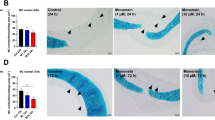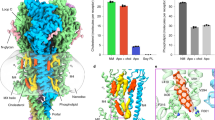Abstract
PARASYMPATHETIC stimulation using either acetylcholine or carbamylcholine at nanomolar to picomolar concentrations enhances antigen-induced release of histamine from various IgE sensitised tissues (human lungs1, human nasal polyps2). The enhancement induced by cholinomimetic compounds is blocked by pretreatment with atropine, so is probably affected through a muscarinic receptor3. However, enhancement of histamine release by cholinergic treatment has not been observed from peripheral human leukocytes sensitised with human IgE (ref. 3). This discrepancy, as well as the lack of information on the effect of acetylcholine on histamine-storing cells, have prompted us to investigate the action of acetylcholine on non-evoked histamine release from isolated purified rat mast cells. To our knowledge, only Kiernan4 has studied the effects of acetylcholine on isolated mast cells, and failed to substantiate any significant morphological change. We present here the results of a study of the effects of acetylcholine on the morphology and on histamine release of rat mast cells, and show that low concentrations of acetylcholine are sufficient to cause histamine release.
This is a preview of subscription content, access via your institution
Access options
Subscribe to this journal
Receive 51 print issues and online access
$199.00 per year
only $3.90 per issue
Buy this article
- Purchase on Springer Link
- Instant access to full article PDF
Prices may be subject to local taxes which are calculated during checkout
Similar content being viewed by others
References
Kaliner, M., Orange, R. P. & Austen, K. F. J. exp. Med. 136, 556–567 (1972).
Kaliner, M., Wassermann, S. I. & Austen, K. F. New Engl. J. Med. 239, 277–281 (1973).
Kaliner, M. & Austen, K. F. A. Rev. Pharmac. 15, 177–189 (1975).
Kiernan, J. A. Experientia 28, 653–655 (1972).
Thon, I. L. & Uvnäs, B. Acta physiol. scand. 71, 303–315 (1967).
Shore, P. A., Burkhalter, A. & Cohn, V. H. J. Pharmac. exp. Ther. 127, 182–186 (1959).
Kremzner, L. T. & Wilson, I. B. Biochim. biophys. Acta 50, 364–367 (1961).
Bergendorff, A. & Uvnäs, B. Acta physiol. scand. 84, 320–331 (1972).
Giotti, A., Guidotti, A., Mannaioni, P. F. & Zilletti, L. J. Physiol., Lond. 184, 924–941 (1966).
Schild, H. O. J. Physiol., Lond. 101, 115–130 (1942).
Lawson, D., Raff, M. C., Gomperts, B. D., Fewtrell, C. & Gilula, N. B. J. Cell Biol. 72, 242–259 (1977).
Krüger, P. G. Int. Archs Allerg. appl. Immun. 51, 608–626 (1976).
Code, C. F. New Engl. J. Med. 296, 1459–1462 (1977).
Johnson, A. R. & Moran, N. C. J. Pharmac. exp. Ther. 189, 221–234 (1974).
Author information
Authors and Affiliations
Rights and permissions
About this article
Cite this article
FANTOZZI, R., MASINI, E., BLANDINA, P. et al. Release of histamine from rat mast cells by acetylcholine. Nature 273, 473–474 (1978). https://doi.org/10.1038/273473a0
Received:
Accepted:
Published:
Issue Date:
DOI: https://doi.org/10.1038/273473a0
This article is cited by
-
Cholinergic Urticaria: Studies on the Muscarinic Cholinergic Receptor M3 in Anhidrotic and Hypohidrotic Skin
Journal of Investigative Dermatology (2010)
-
New concepts of hive formation in cholinergic urticaria
Current Allergy and Asthma Reports (2009)
-
Interactions of mast cells with the nervous system ?Recent advances
Neurochemical Research (1992)
-
Decrease in blood histamine in drug-treated Parkinsonian patients
Molecular and Chemical Neuropathology (1991)
-
Histamine release by platelet aggregation
Agents and Actions (1990)
Comments
By submitting a comment you agree to abide by our Terms and Community Guidelines. If you find something abusive or that does not comply with our terms or guidelines please flag it as inappropriate.



